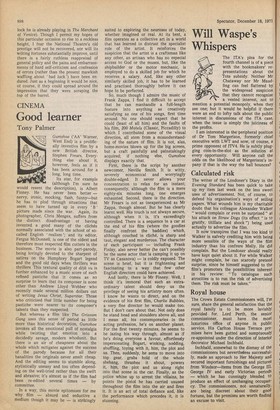CINEMA
Good learner
Tony Palmer
Gumshoe ('AA' Warner, West End) is a prolifically inventive film by a new British director, Stephen Frears. Everything else about it, however, feels as if it has been around for a long, long time.
Its star, for example (although I'm sure he would resent the description), is Albert Finney. He has never been better — nervy, ironic, mocking, flash, funny—but he has to plod through situations that seem to have turned up in every 'B ' picture made since the war. Again, its photographer, Chris Menges, suffers from the distinct disadvantage of having invented a good many of the cliches normally associated with the school of socalled English ' realism '; and its editor, Fergus McDonnell, is one of the oldest and therefore most respected film cutters in the business. The movie is also part-parody, being lovingly devoted to the sharpest of satires on the Humphrey Bogart legend and the good old days when thrillers was thrillers This textural quality of déjà vu is further enhanced by a music score of such refined pastiche that it comes as no surprise to learn that its composer is none other than Andrew Lloyd Webber who recently made several million dollars out of writing Jesus Christ, Superstar. Those who criticised that little number for being pastiche were nearer to its composer's talents than they suspected.
But whereas a film like The Grissom Gang uses this sense of period as little more than historical decoration, Gumshoe invokes all the emotional pull of nostalgia while twisting that emotion into a decidedly savage, modern whodunit. But there is an air of cheapness about the whole which mitigates against the success of the parody 'because for all their banalities the originals never smelt cheap.
And the editing seems to stumble along, stylistically uneasy and too often depending on the well-tried rather than the swift and abrasive; it's almost as if the film had been re-edited several times — by committee.
In a way, this movie epitomises for me why film — absurd and seductive a medium though it may be — is strikingly suited to exploring the neuroses of today, whether imagined or real. At its best, a film operates as a collective art in a world that has learned to distrust the specialist role of the artist. It reinforces the suspicion that the artist is a craftsman like any other, an artisan who has no especial access to God or the muses, but, like the shipbuilder or the motor mechanic, is employed to do a skilled job for which he receives a salary. And, like any other similarly skilled job, it has to be learned and practised thoroughly before it can hope to be perfected.
So, much though I admire the music of Frank Zappa, I find it difficult to accept that he can manhandle a full-length feature into anything as creatively satisfying as one of his songs, first time around. No one should expect that he could (least of all him) and the faults of his film, 200 Motels (Classic, Piccadilly) to which I contributed some of the visual direction, all stem from a misunderstanding of the nature of film. It is not, alas, home-movies blown up for the big screen, but a craft painfully and painstakingly acquired; if nothing else, Gumshoe displays exactly that.
First, there is the script by another newcomer, Neville Smith. It is witty, severely economical and worryingly double-edged. It never allows your concentration to relax for an instant; consequently, although the film is a mere eighty-Six minutes long, one emerges exhausted. Second, there is the direction. Mr Frears is not as inexperienced as Mr Zappa, though almost. But he has clearly learnt well. His touch is not always secure, although when it is, it's exceedingly controlled. There is a sequence in a car at the end of his film (where the goodies finally confront the baddies) which, although couched in cliché, is sharp and taut, elegant and murderous. The character of each participant — including Frank Finlay, also never better (he can't possibly be the same actor that is camping it up on TV as Casanova) — is coldly exposed. The scene is brief, but it is frightening and fascinating in a way that few other English directors could have achieved.
And lastly, there is Mr Finney. Well, I think it's immoral that such an extraordinary talent should deny us the privilege of seeing his artistry more often. I know he wants to direct, and on the evidence of his first film, Charlie Bubbles, a very fine director he would make too. But I don't care about that. Not only does he stand head and shoulders above all, and I mean all, his contemporaries in the acting profession, he's on another planet. For the first twenty minutes, he seems to be lazing his way through, almost as if he's doing everyone a favour, effortlessly impersonating Bogart, winking, nodding, shuffling, toying with it, him, the plot and us. Then, suddenly, he sems to move into top gear, grabs hold of the whole shebang, thrashes it about, powers it, him, the plot and us along right into that scene in the car. Finally, as the police Whine up to arrest the villains, he points the pistol he has carried unused throughout the film into the air and fires 'it. It is an act of total defiance and, like the performance which precedes it, it is stunning.










































 Previous page
Previous page